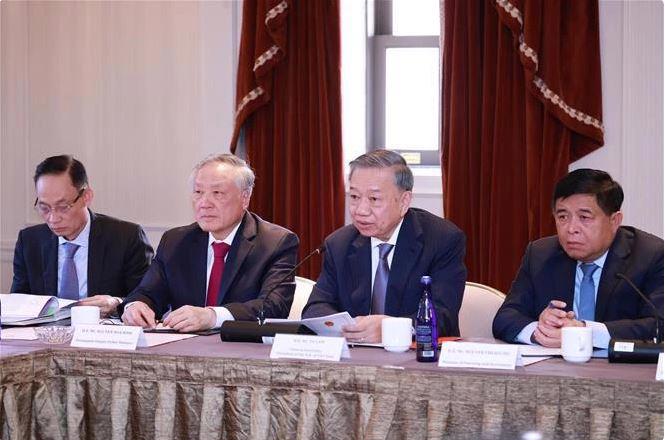Party General Secretary and State President To Lam attended a seminar on enhancing Vietnam-US cooperation in the development of the semiconductor and artificial intelligence (AI) industries in New York on September 22 (New York time) as part of his attendance at the High-level Week of the 79th session of the UN General Assembly and working trip to the US, according to a report from the Vietnam News Agency.
The event was also attended by leaders and experts from the world’s leading technology groups and organizations in the semiconductor and AI industries such as AMD, Google, Marvell, the US Semiconductor Industry Association (SIA) and the Global Semiconductor Alliance (SEMI).
Opening the seminar, Vietnamese Minister of Planning and Investment Nguyen Chi Dung said Vietnam-US relations have constantly been developing in all areas over the past time, especially economic-investment-trade partnerships.
The minister highlighted the huge potential for cooperation between Vietnamese and US partners in the field of high technologies such as semiconductor and AI, stressing that this partnership will open up opportunities for enterprises of both countries to uphold and exploit each side’s advantages.
Vietnam promulgated a strategy on AI development in 2021 and under Prime Ministerial Decisions dated September 21, 2024, a program on developing human resources for the semiconductor industry, and a national strategy on developing the semiconductor industry have been approved, according to the minister.
Vietnam will step up the training of high-quality human resources for the sector in coming time with the aim of training 50,000 engineers by 2030, the minister added.
At the seminar, representatives of leading technology organizations and groups of the US and the world shared international experiences in developing the semiconductor and AI industries, and pointed out huge potential and cooperation opportunities with Vietnam in these fields.
Experts highly evaluated Vietnam’s strategy on developing the semiconductor and AI industries, and expressed their belief that, with these orientations, the country will become an attractive destination for investors in these areas and achieve successes in the future.
Speaking at the event, Party General Secretary and State President To Lam clearly stated that Vietnam has defined rapid and sustainable national development based on science-technology and innovation.
The Vietnamese Party and State already defined three strategic breakthroughs for socio-economic development, namely institutions, infrastructure and human resources combined with restructuring the economy and renewing the growth model, and promoting the national development based on science-technology, innovation and cultural values of Vietnamese people, the Vietnamese leader said.
Developing the semiconductor and AI industries is an objective requirement, a strategic choice and a priority in scientific and technological development, which will push up the development of other supporting industries, the top leader stressed.
He noted that Vietnam is currently at an important moment in the transition towards a digital economy, green economy, and circular economy and is prioritizing the strong development of science-technology and innovation to create breakthroughs in productivity, quality and increasing the competitiveness of the economy.
In that context, Vietnam encourages and prioritizes attracting selective investment, targeting high-tech projects, semiconductor and AI research and development, renewable energy, and green hydrogen, building synchronous infrastructure, the Vietnamese leader said, adding that these are also areas where US investors have a lot of potential and strengths.
Reviewing the positive results that the Vietnam - US cooperative relationship has brought since the normalization of relations in 1995, Mr. Lam affirmed the cooperation potential of Vietnamese and US partners in high-tech fields such as semiconductors and AI is extremely huge and meaningful in the new era, especially after Vietnam and the US upgraded their relationship to a Comprehensive Strategic Partnership with two breakthrough cooperation pillars: innovation and semiconductor industry.
The leader expressed his belief that cooperation in the semiconductor and AI industries will open up opportunities for businesses of both countries to bring into play and exploit each other’s advantages.
Highlighting Vietnam’s strengths and opportunities for the development of the semiconductor and AI industries, the Vietnamese leader said over the past 20 years, Vietnam has trained hundreds of thousands of programmers and millions of personnel for the information technology industry. These are an important foundation to affirm that human resources in the AI and semiconductor industries are one of the strengths of Vietnam, he elaborated.
Currently, many large enterprises in electronics, information technology, semiconductor and AI industries such as Samsung, Amkor, Hana Micron, Intel, Foxconn, LG, Viettel, VNPT, and FPT are investing in Vietnam while many other companies are completing final procedures to deploy research and development, production and business activities in the country, Mr. Lam told participants.
He affirmed that Vietnam always values international cooperation and understands that to succeed and advance in high-tech fields, especially the semiconductor and AI industries, it is necessary to go together and build a solid value chain. At the same time, Vietnam welcome US businesses and organizations to the country to jointly develop creative and sustainable solutions, he stressed.
The leader expressed his belief that with the contributions of all, the Vietnam-US Comprehensive Strategic Partnership will become increasingly practical and effective, contributing the sustainable development.









 Google translate
Google translate